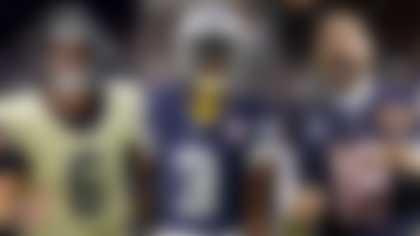Former NFL player and scout Bucky Brooks knows the ins and outs of this league, providing keen insight in his weekly notebook. The topics of this edition include:
But first, a look at how the Seattle Seahawks continue to get the most out of undrafted free agents ...
* * * **
ASK THE LEAGUE: Did the Eagles fleece the Vikings?
When the Minnesota Vikingstraded for veteran quarterback Sam Bradford in the wake of Teddy Bridgewater's devastating knee injury, the Twitter-verse nearly went up in flames, with everyone weighing in to name winners and losers. Looking at my mentions, it appears that fans overwhelmingly admonished the Vikings for mortgaging their future -- Minnesota shipped a first-round pick in 2017 and a conditional fourth-round pick in 2018 to Philadelphia -- to land an oft-injured quarterback who does not have a single playoff appearance on his resume. When I clicked onto NFL Network, I saw several of my colleagues weigh in with various opinions on who got it right or wrong in this scenario.
After listening to the back-and-forth banter over the weekend, I decided to reach out to some of my contacts within the league to get their take on the blockbuster deal. Here's my question and their responses:
*Did the Vikings give up too much for Sam Bradford? *
NFC pro personnel assistant director: "I think that if you get a guy that you want and he's capable of helping you win games, the price is never too high. Based on getting a known commodity in Bradford versus an unknown draft pick, I think they made the right move ... Sure, there is some risk, but you have to do what's best for your team, and they did that."
AFC director of pro scouting: "I think they gave up too much. I'm sure there were other teams with quality quarterbacks that didn't ask them to pay such a hefty price. That being said, the sharks could smell the blood and realize how desperate the Vikings were to get a guy ... Minnesota will realize they overpaid during draft week when they start looking at the quarterbacks they could've had."
NFC pro personnel director: "Not if they believe that they will be picking at the bottom of the first round [because they are in the playoffs]. Plus, I think it shows how bad Teddy's injury must really be."
Former vice president of player personnel for multiple NFL teams: "Yes. They gave up a lot, but they had to do it. They needed a quarterback, and they needed one in a hurry, so they had to do whatever it took to get one."
AFC senior player personnel executive: "I think so. I believe it was a knee-jerk reaction ... To give up a first and an additional high pick for a guy who hasn't met expectations after several years in the league is a questionable move."
I'm all in with the Minnesota Vikings on their decision to acquire Bradford. The team desperately needed a legitimate starting quarterback to remain viable contenders in the NFC with Bridgewater out. The Vikings are built like a heavyweight contender (they have a stout defense, strong running attack and dynamic perimeter playmakers), but they needed an efficient distributor to manage the game and get the ball to their weapons on the perimeter. Remember, this is a team that is constructed around an All-Pro running back (Adrian Peterson) and a stingy defense. Vikings coach Mike Zimmer has repeatedly stressed the importance of building a team that is not wholly dependent on the quarterback, and it has been reflected in the team's play.
The Vikings averaged the fewest pass attempts per game (28.4) in 2015 while leaning on Peterson as their primary offensive weapon. The veteran runner responded in splendid fashion by leading the NFL in rushing yards (1,485) and rushing attempts (327). Most impressively, he finished with seven 100-yard games and helped the team post an 8-1 record when he logged 20 or more carries in 2015. Those numbers perfectly align with the conservative blueprint that worked well for Bridgewater. The Vikings were 7-0 when their young quarterback finished with 25 or fewer pass attempts compared to their 4-5 mark when Bridgewater logged more than 25 pass attempts.
Thus, Bradford steps into a situation where he simply needs to act as a mailman from the pocket. If he takes care of the ball and allows his stellar supporting cast to go to work, he could help the Vikings earn a ticket to the postseason dance. The critics will point out that Bradford's fragile body makes it hard to depend on him as a starter (he's missed 33 games in six seasons), but the 2010 Offensive Rookie of the Year has shown flashes of being a solid playmaker at the position, including an impressive five-game run to close the 2015 season (67 percent completion rate with an 8:4 touchdown-to-interception ratio). Considering he is playing with best supporting cast he's ever had as a pro, he should thrive in coordinator Norv Turner's system, with his former offensive coordinator (tight ends coach Pat Shurmur, who worked with Bradford in St. Louis in 2010 and in Philadelphia last season) on the staff.
Looking at the draft-pick compensation the Vikings surrendered to the Eagles, I don't believe the loss of a first-round pick is a death blow to the defending NFC North champs. The Vikings remain well-positioned to make an impact in the 2017 NFL Draft, given that they still have eight total picks, including a pair of third-rounders and a couple of fourth-round selections. That's more than enough ammunition to create a package that allows them to move into range to grab a blue-chip player within the top 40 picks.
By the way, the concern over the Vikings' loss of picks should be mitigated by their overwhelming success selecting blue-chip players in the first round. Since 2012, the Vikings have selected Matt Kalil, Harrison Smith, Sharrif Floyd, Xavier Rhodes, Cordarrelle Patterson, Anthony Barr, Bridgewater, Trae Waynes and Laquon Treadwell with their Day 1 picks. Considering the promise shown by the Vikings' young core, general manager Rick Spielman could afford to take a risk to acquire a player who could help the team make a deep playoff run -- which, by the way, will make people quickly forget about the cost of doing business in today's game.












